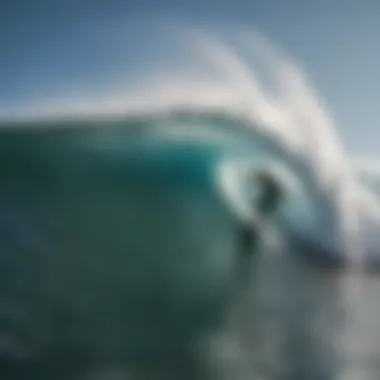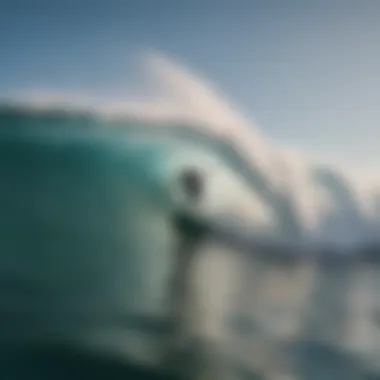Unleashing the Wave Mastery: A Deep Dive into Surf Coaching Techniques


Surfboarding Techniques
As you delve into the art of surf coaching, understanding the various surfboarding techniques is essential to mastering the waves. Different types of waves present unique challenges and opportunities for surfers. Whether it's a mellow rolling wave or a steep, barreling one, knowing how to navigate each type is key to improving your skills. The pop-up technique, fundamental to catching waves, requires a swift movement from prone to standing position. This quick and fluid motion is crucial for maintaining speed and balance on the board. The bottom turn maneuver, a foundational surfing move, involves using the bottom of the wave to generate momentum for subsequent maneuvers. Duck diving, a technique for getting under waves, is essential for navigating through breaking waves efficiently. The cutback, a stylish and dynamic turn, allows surfers to redirect their momentum on the wave, showcasing skill and creativity.
Surfboard Maintenance and Care
Beyond mastering surfboarding techniques, proper maintenance and care of your surfboard are paramount for longevity and optimal performance. Cleaning your surfboard regularly not only enhances its aesthetics but also ensures that there is no residue or buildup affecting your ride. Repairing dings and cracks promptly is crucial to prevent water damage and maintain the structural integrity of your board. Regularly waxing your board provides traction and grip, essential for maneuvering on the waves. Changing fin setups can diversify your surfing experience, allowing for customization based on the conditions of the waves you're riding. Storing your board properly, away from direct sunlight and extreme temperatures, prolongs its lifespan and performance.
Surfing Destinations and Travel Tips
For avid surfers, exploring top surfing destinations worldwide is an exciting opportunity to experience different waves and cultures. Choosing the right surfing destination involves considering factors like wave conditions, crowd levels, and amenities. A surf trip planning guide can help you organize accommodation, transportation, and surfing activities efficiently. Surf safely abroad by familiarizing yourself with local regulations, hazards, and emergency procedures. Immersing yourself in local surfing cultures provides a deeper appreciation for the sport and connections with fellow enthusiasts.
Surfboard Gear and Equipment
Understanding the various types of surfboards, such as shortboards, longboards, and fish boards, helps you select the most suitable option for your skill level and surfing style. Essential surfing accessories like leashes, fins, and wetsuits enhance your comfort and safety in the water. Choosing the right surfboard based on your experience level ensures optimal performance and progression. Maintaining and upgrading your gear regularly extends its lifespan and ensures peak performance. Stay updated on surfing technology and innovation to leverage new advancements for a more enhanced surfing experience.
Introduction to Surf Coaching
In the vast realm of surfing, where conquering the waves requires a blend of skill, technique, and mindset, surf coaching emerges as a vital component in advancing one's abilities on the board. This section delves deep into the foundational aspects of surf coaching, serving as a compass for both novice riders seeking to grasp the basics and seasoned surfers aiming to refine their maneuvers.
Understanding the Role of a Surf Coach
The significnace of mentorship in surfing
Delving into the profundity of mentorship within the realm of surfing unveils a nuanced relationship dynamic where guidance transcends mere instructions. Mentors in surfing play a pivotal role not just in imparting technical knowledge but in nurturing resilience, fostering a connection with the waves that goes beyond surface-level learning. The mentorship bond embodies trust, patience, and a shared passion for the art of surfing, enhancing not only the learner's skills but also their intrinsic love for the sport. The significance of mentorship in surfing creates a gateway for surfers to delve deeper into their potential, transcending personal limits and embracing the ethos of continuous growth.
The evolution fo surf coaching
Tracing the narrative arc of surf coaching from its embryonic stages to the contemporary landscape unveils a metamorphosis driven by innovation and experience. The evolution of surf coaching mirrors the evolution of surfing itself, adapting to technological advancements, pedagogical insights, and the dynamic relationship between surf coaches and their proteges. Through this evolution, surf coaching has transcended from a mere guidance tool to a personalized, holistic approach to skill enhancement, amalgamating tradition with modernity. The evolution of surf coaching encapsulates a narrative of refinement, where the quest for mastery intertwines with the fluidity of wave dynamics, creating a tapestry of learning experiences unique to each surfing journey.
Key Responsibilities of a Surf Coach
Skill assessment and goal setting
At the core of a surf coach's responsibilities lies the art of skill assessment and goal setting, a meticulous process that forms the cornerstone of effective coaching. By delving deep into a surfer's strengths, weaknesses, and aspirations, a surf coach can tailor personalized training regimens that propel the learner towards their surfing goals. The symbiotic dance between skill assessment and goal setting not only ignites progression but also instills a sense of purpose and direction in the surfer's journey, fostering a growth mindset that transcends the boundaries of the ocean.
Technique refinement and feedback


The essence of surf coaching blooms through the delicate balance of technique refinement and feedback, where minute adjustments sculpt the surfer's proficiency on the board. A proficient surf coach not only identifies areas of improvement but also delivers feedback in a constructive, empowering manner that catalyzes growth. The refinement of techniques under the watchful eye of a seasoned coach unveils hidden potential, reshaping the rider's approach to surfing and instilling a sense of craftsmanship in each wave conquered.
Benefits of Enlisting a Surf Coach
Accelerated skill development
The allure of accelerated skill development beckons surfers to enlist the aid of a skilled coach, where expertise meets passion in the quest for mastery. Through structured training modules, personalized feedback, and immersive learning experiences, surf coaches pave the way for rapid skill enhancement, transforming novices into proficient riders within a condensed timeframe. The accelerated skill development under a coach's guidance not only expedites progress but also imbues a sense of purpose and dedication in every surfing session, creating a trajectory of growth that transcends mere technical proficiency.
Enhanced wave selection abilities
Navigating the vast expanse of ocean waves demands more than just technical finesse; it requires a keen eye for wave selection that sets expert surfers apart. Enlisting a surf coach equips riders with the tools to decipher wave patterns, understand tidal dynamics, and hon perceptions, leading to enhanced wave selection abilities that elevate the surfing experience. With a coach's guidance, surfers hone their wave-riding acumen, allowing them to anticipate, adapt, and conquer each wave with precision and grace, crafting a narrative of surfing mastery that echoes through each crest and trough.
Essential Techniques Taught by Surf Coaches
Surf coaching is an indispensable component in the journey of any aspiring surfer. Through personalized guidance and expert instruction, surf coaches provide invaluable insights and techniques aimed at honing one's skills on the waves. This section aims to delve into the core principles of surf coaching, emphasizing the significance of mastering fundamental techniques under the guidance of experienced mentors.
Perfecting the Pop-Up
Mastering the quick and efficient pop-up technique:
Mastering the pop-up is fundamental for surfers of all levels as it dictates the smooth transition from paddling to standing on the surfboard. This technique requires swift coordination and agility to catch waves effectively. The key lies in positioning your body correctly and executing the movement in a fluid motion. The efficiency of the pop-up is crucial for catching waves before they break, enhancing the overall surfing experience.
Correcting common mistakes in pop-up execution:
Addressing common mistakes in the pop-up technique is paramount for surfers looking to improve their performance. Analyzing and rectifying errors such as a slow or incorrect pop-up can significantly impact wave-catching abilities. By focusing on body positioning, timing, and balance, surf coaches play a vital role in refining this essential skill. Identifying and correcting these mistakes can lead to a noticeable enhancement in a surfer's overall surfing proficiency.
Navigating the Line-Up
Understanding wave dynamics and positioning:
Navigating the line-up requires surfers to comprehend the intricacies of wave formation and positioning in the water. By understanding how waves break and shift, surfers can anticipate the best place to catch a wave. This not only improves wave-catching efficiency but also enhances the overall surfing experience by maximizing time on the waves.
Strategies for efficient paddling and wave selection:
Efficient paddling and strategic wave selection are fundamental aspects of successful surfing. Surf coaches emphasize techniques to optimize paddling efficiency and choose the most suitable waves based on skill level. By honing these strategies, surfers can increase their wave count and overall enjoyment in the water.
Executing Advanced Maneuvers
Learning aerial maneuvers and cutbacks:


Mastering advanced maneuvers such as aerials and cutbacks elevates a surfer's skill set to new heights. These dynamic techniques require precision, speed, and coordination to execute seamlessly on the waves. By incorporating aerial maneuvers and cutbacks into their repertoire, surfers can enhance their style and versatility, setting them apart in the lineup.
Enhancing speed and fluidity in surfing:
Speed and fluidity are key elements in high-performance surfing. Coaches focus on techniques that enhance a surfer's speed on the wave while maintaining a smooth and controlled style. By refining these aspects, surfers can elevate their surfing prowess, enabling them to tackle more challenging waves with confidence and finesse.
The Psychology Behind Surf Coaching
Surf coaching extends beyond physical techniques; it delves deep into the psychology of surfing. Understanding the mental aspects of surfing is crucial for overall growth and proficiency in the sport. It involves building confidence, resilience, and effective communication between coach and student. The psychology behind surf coaching plays a fundamental role in shaping a surfer's mindset and approach to the waves. Dive into the world of surf coaching psychology to unravel its significance.
Building Confidence and Mental Resilience
Overcoming fear of waves and wipeouts
Overcoming the fear of waves and wipeouts is a transformative journey that surfers undertake to push past their limits and evolve. Fear can be a dominant force holding surfers back from realizing their full potential. By addressing and conquering this fear, surfers can unlock new levels of performance and confidence in the water. Developing strategies to overcome fear equips surfers with mental fortitude and courage, enabling them to navigate challenging conditions with ease.
Developing a positive surfer mindset
Fostering a positive mindset in surfing is a game-changer for surfers looking to elevate their skills. A positive surfer mindset cultivates resilience, adaptability, and a growth-oriented approach to learning. By fostering positivity, surfers can better handle setbacks, stay focused during challenging sessions, and celebrate successes. Developing a positive mindset enhances overall performance and nurtures a passion for continuous improvement.
Visualizations and Mindfulness Techniques
Utilizing mental imagery for improved performance
Leveraging mental imagery is a powerful technique that surfers use to enhance their performance. Visualizing successful maneuvers, perfect waves, and ideal surf conditions can prime the mind for actual execution in the water. By incorporating mental imagery into their training, surfers can improve muscle memory, increase confidence, and refine their technique effectively.
Practicing mindfulness for heightened focus and presence
Mindfulness techniques are essential for surfers seeking to enhance their focus and presence in the water. Practicing mindfulness cultivates a deep sense of awareness and concentration, allowing surfers to stay present in the moment and make split-second decisions with clarity. By honing mindfulness skills, surfers can maximize their performance, increase their response time to waves, and experience a deep connection with the ocean.
Effective Communication Strategies
Establishing clear feedback channels
Clear communication channels between coach and surfer are pivotal for constructive feedback and progress. Establishing clear feedback channels fosters a collaborative environment where surfers can receive specific guidance on their technique, performance, and goals. Effective feedback mechanisms empower surfers to address weaknesses, refine their skills, and achieve continuous improvement in their surfing journey.
Enhancing student-coach communication dynamics
Strong communication dynamics between students and coaches lay the foundation for a successful coaching relationship. Enhancing communication channels ensures that information is conveyed accurately, feedback is constructive, and goals are aligned. By fostering open dialogue and trust, student-coach communication dynamics facilitate a supportive environment for skill development, goal setting, and overall progress in surfing.


The Future of Surf Coaching
Surf coaching is not static but an ever-evolving field that adapts to new technologies and approaches, ensuring surfers receive the best possible guidance. In this rapidly changing landscape, the future of surf coaching holds immense promise and exciting developments. As the sport of surfing grows in popularity, the need for innovative coaching methodologies becomes paramount.
Technological Advancements in Coaching
Integration of drones for performance analysis
Surf coaching has witnessed a significant transformation with the integration of drones for performance analysis. These aerial devices provide coaches with a bird's eye view of their students' surfing techniques, allowing for in-depth assessment and precise feedback. The utilization of drones enhances the coaching experience by capturing data that is otherwise inaccessible from the shore.
Drones offer a unique advantage in analyzing surfers' positioning, wave selection, and execution of maneuvers. By leveraging this technology, coaches can pinpoint areas for improvement and tailor their feedback to enhance overall performance. While drones present a valuable tool for detailed performance evaluation, they also require proper handling and a skilled operator to maximize their benefits.
Virtual reality simulations for surf skill enhancement
Virtual reality simulations are revolutionizing the way surfers hone their skills. By immersing surfers in simulated wave environments, virtual reality technology provides a safe and controlled space for practice and skill development. Surfers can practice complex maneuvers, perfect their timing, and refine their techniques in a virtual setting.
The key characteristic of virtual reality simulations lies in their ability to offer realistic surf scenarios that mimic real-life conditions. Surfers can experience various wave types, sizes, and speeds, allowing them to adapt and improve their surfing abilities dynamically. While virtual reality simulations offer unparalleled training opportunities, they also necessitate access to specialized equipment and platforms for optimal user experience.
Innovative Training Methodologies
Surf-specific fitness regimens and cross-training
Surf-specific fitness regimens are tailored exercises designed to enhance surfers' physical abilities and overall performance in the water. These regimens focus on strength, flexibility, balance, and endurance, targeting key muscle groups utilized during surfing maneuvers. Cross-training complements these regimens by incorporating activities that improve cardiovascular health and agility.
The unique feature of surf-specific fitness regimens lies in their targeted approach to addressing the specific physical demands of surfing. By engaging in exercises that mimic surfing movements, surfers can improve their core stability, paddling power, and endurance. While surf-specific fitness regimens yield numerous benefits for surfers, they require consistency and commitment to achieve optimal results.
Utilization of data analytics for personalized coaching
Data analytics have revolutionized the way surf coaches analyze and interpret surfers' performance data. By collecting and processing data on various surfing metrics, coaches can gain valuable insights into surfers' strengths, weaknesses, and progression over time. This data-driven approach enables coaches to tailor their training programs and feedback to each surfer's unique needs.
The key characteristic of utilizing data analytics in coaching is its ability to provide objective and quantifiable feedback to surfers. By tracking metrics such as wave count, ride length, and maneuver accuracy, coaches can identify patterns and trends to inform coaching strategies effectively. While data analytics offer valuable insights for personalized coaching, they also require reliable data sources and analytical tools for accurate interpretation.
Sustainability and Environmental Awareness
Promoting eco-friendly surfing practices
The surfing community is increasingly aware of the environmental impact of the sport and is taking proactive steps to promote eco-friendly practices. From reducing plastic waste to supporting sustainable surfboard shaping techniques, surfers are embracing eco-conscious initiatives to protect the oceans they love. Promoting eco-friendly surfing practices not only safeguards the marine environment but also fosters a sense of responsibility and stewardship among surfers.
The key characteristic of promoting eco-friendly surfing practices is its dedication to minimizing ecological harm while maximizing enjoyment of the ocean. By adopting practices such as beach clean-ups, plastic-free surf events, and sustainable product choices, surfers can contribute to a cleaner and healthier marine ecosystem. While promoting eco-friendly surfing practices is essential for environmental preservation, it requires collective action and community cooperation to effect lasting change.
Creating ocean-conscious surf communities
Building ocean-conscious surf communities entails nurturing a collective mindset that prioritizes environmental stewardship and conservation. By organizing beach conservation initiatives, educational workshops, and advocacy campaigns, surf communities can instill a culture of respect and appreciation for the marine environment. Creating ocean-conscious surf communities not only fosters environmental awareness but also cultivates a sense of connection and kinship among surfers.
The unique feature of ocean-conscious surf communities lies in their ability to unite surfers in a shared commitment to protecting the oceans. Through collaborative efforts and eco-friendly practices, surf communities can amplify their impact and inspire positive change within the surfing world. While creating ocean-conscious surf communities is essential for preserving marine ecosystems, it requires active participation and engagement from surfers at all levels to make a meaningful difference.







